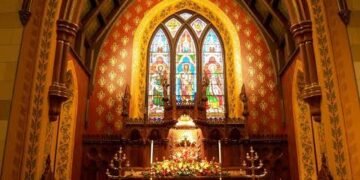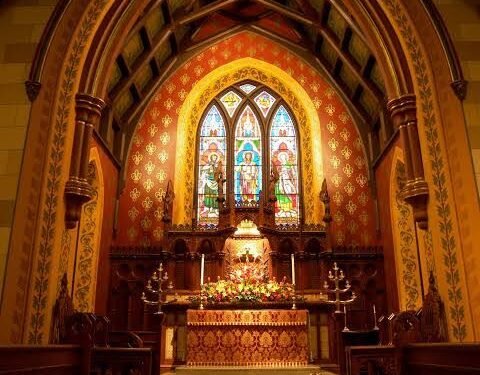Fr George AdimikeThough the intimate connection between the Eucharist and Pentecost is relatively obscure and somewhat misunderstood, the link underscores the indispensable role of the Holy Spirit in the ecclesial life. As the mystery of gathering in the fruits of the Paschal mystery and the dress rehearsal of the eschatological banquet in heaven, the Eucharist is motorised by epiclesis (invocation of the Spirit). It is also a context for the outpouring of the Holy Spirit. Beyond being the ritual re-enactment of the Paschal mystery, the Easter of quotidian celebration, the Eucharist is the daily Pentecost. It is Pentecost, in which the epicletic dimension of the Church is activated daily. The Eucharist is Pentecost in character and context since the Holy Spirit activates the presence of Christ in the Church. In the Eucharist, the priest leads the assembly (the ecclesia of God) to ask God anew to send the Holy Spirit. The invocation of the Holy Spirit and his advent to the elements and the assembly actuates the real body of Christ (Eucharist) and his mystical body (Church).
Both Pentecost and the Eucharist are a jubilee in content and a harvest in context. They are thanksgiving celebrations for God’s benevolence through the provision of material and spiritual gifts, the constitution of identity, the harvest of graces and the manifestation of the Holy Spirit. The Paschal mystery is undoubtedly geared towards gifting the Holy Spirit, who is the assurance of salvation. As the Uncreated Grace through whom we subjectively possess the salvation of Christ, the Spirit is the best gift and the First Fruit of the Paschal mystery. As such, Easter and Pentecost are intrinsically connected because Pentecost fulfils and seals the Easter mystery. The whole mystical circle of the Paschal mystery is celebrated in the Eucharist, so both Easter and Pentecost are perfectly integrated into the Eucharistic celebration.
From the Greek word pentēkostē, which means the fiftieth day, Pentecost serves as the Greek equivalent of the Jewish Feast of Weeks, Shavuot. It is also called the Feast of Fifty Days, the Feast of First Fruits, or the Feast of Harvest, celebrated a day after seven full weeks, counting from the second day of Passover (cf. Leviticus 23: 5-8, 15-17). It was the microcosm of the jubilee, the fiftieth year; it is 50 years collapsed into 50 weeks. The Hellenist Jews called it Pentecost, but the homestead Jews called it Shavuot, the Feast of Weeks. It was a joyous thanksgiving celebration and presentation of the first fruit offerings to the Lord. And in the rabbinic tradition, Pentecost (Shavuot or Feast of Weeks) was also the context of the Lord’s giving of the Law (Ten Commandments) to Moses on Mount Sinai (cf. Exodus 19; 24), which could be termed the rally of Passover, and rightly, the logical culmination of their redemptive mystery. During this first Pentecost, the Lord created a treasured people out of the Israelites by giving them the Law as a seal of their covenant. Similarly, during the Pentecost of the new covenant, the Lord created a new people, the Church, by giving them His Spirit as a seal and culmination of the Paschal redemption.
In popular Christian religious imagination, Pentecost is the setting for the outpouring of the Spirit and has also become its metaphor. From the original Jewish Shavuot or Feast of Weeks, which combined the harvest celebration, the commemoration of the apotropaic Passover and the revelation of the Law, Pentecost has found resonance in the Eucharist. The Eucharist commemorates the redemptive mystery of the Cross, celebrates the victory over death at the resurrection, and gives thanks for the precious gift of the Spirit and the harvest of redeemed souls. Though the Holy Spirit is the principal agent of this Paschal event, he is also its first fruit. The Spirit is the effect of the Paschal mystery and its fruit. The Eucharist, which re-enacts this mystery, is Pentecost, in which the Holy Spirit descends anew on the Church. The Eucharist becomes, as it were, the fountain of fresh anointing.
The Eucharist is always instituted anew at the invocation of the Spirit as the Church is constantly constituted. Though already instituted and constituted several centuries ago, they are ever constituted anew at each celebration of the Eucharist. The Holy Spirit comes now and again; thus, we have an ecclesia and the Eucharist. It is so precisely because, in each Eucharistic celebration, the Holy Spirit comes anew. It’s a new experience of Pentecost. In the Eucharist, the Spirit of the Father turns the elements into the body and blood of the Son and turns the assembly into a mystical body of Christ so that they can be true people of God. The Church makes the Eucharist, and the Eucharist makes the Church. In the power of this Holy Spirit, we are made children of God by divine adoption. The same Holy Spirit capacitates us for the relationship with the Father, feeds our audacity, echoes our prayers, joys and cries, and enables our relationship with Christ. He is the kinetic power of God in each of us that makes us believers. He comes before, preparing us to receive the Word; he opens us up and disposes us to receive the Word, accompanies the Word, and stays to let the Word accomplish its mission in us.
This Holy Spirit, therefore, is the anointing we receive each time we participate in the Eucharist. In the Trinitarian communion that exists in the Eucharist, the ‘We-of-God-in-person’, the Spirit of the Son and the Father, transforms the Church into an everlasting presence of Christ. In the Eucharist, the Spirit, whose presence is the anointing, refreshes, refills, strengthens, heals, breaks the yokes of sin (of evil habits, difficulties and challenges), and frees one from burdens. He is the original anointing of which all other anointings are types and sacraments. This anointing is the Eucharist. The Eucharistic mystery is, therefore, the anointing experience of the new Pentecost. As we experience Pentecost each day, whenever we receive the Eucharist, it calms, empowers, accomplishes and transforms us.
Fr George Adimike
findfadachigozie@gmail.com














































